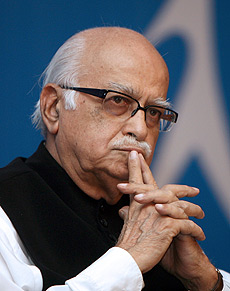
A new weekly has been launched in the capital. The Editor is M. J. Akbar; the Chairman is Ram Jethmalani; the name of the paper is The Sunday Guardian.
The last issue of this journal (April 4, 2010) carries an interesting article by Jethmalani. The title of this article sounds provocative : “Hindutva is not property of BJP”. Some of my party colleagues may take umbrage, and presume the article is critical. It is not. It is complimentary.
Indeed, the stress is on Indian Secularism having its roots in Hindutva. Jethmalani had very ably argued Shiv Sena leader Manohar Joshi’s case in the Supreme Court, and secured Justice Verma’s landmark judgement on Hindutva in which the Court declared : “Hindutva is a way of life or state of mind and cannot be understood as religious Hindu fundamentalism”. In his article the learned lawyer observes: “It is a pity that the BJP has not been able to explain to people that Hindutva and Indian secularism are practically synonyms.”
***
In the late eighties while I was president of BJP, I recall a phone call from a Canadian Television Team which had come to New Delhi. I was told that this TV Team was producing a television serial titled “The Rise and Fall of Democracies around the Globe”.
The TV anchor who spoke to me said: “We are greatly impressed by the manner in which India has sustained democracy for four decades, and the smooth and peaceful changes of Government that have been taking place through the ballot box, both at the Centre as well as in the states. We believe that you are one of the few political leaders who have been an active participant in all the parliamentary elections held in independent India, that is, since the first General Elections of 1952. We are keen to interview you .”
The Team met me at our Ashok Road Party Office lawns and wanted to know my analysis as to why democracy had been such a success in this country. My answer was; “I hold that the most important ingredient for a successful democracy is readiness of the people of that country to accept that on any issue there are bound to be divergent views and that citizens generally must be informed by an attitude of tolerance toward diametrically different points of view. And in India, this has never been lacking.”
In human history, intolerance towards a different point of view has been reflected most in the field of religion. In the west, well known scientists like Galileo have had to face the Inquisition, and recant all such scientific discoveries as were contrary to the writings in the religious scriptures, even though scientifically the soundness of these discoveries was unquestionable.
In sharp contrast, there has been in India, even in purely religious matters an open-minded and liberal approach. Amidst an overwhelmingly theist populace, we had a rank materialist and atheist like Charvaka questioning the existence of God, ridiculing the doctrine of rebirth and advocating an eat, drink and make merry approach, and yet not being just ‘tolerated’, but being actually respected as ‘Rishi Charvaka’.
Fareed Zakaria, Editor of Newsweek International, has recently written a book “The Post American World” in which he has repeatedly emphasized that Hinduism is not a religion in the ‘Abrahamic’ sense of the word. Zakaria writes:
“Every sect and sub-sect of Hinduism worships its own God, Goddess, or holy creature. Every family forges its own distinct version of Hinduism. You can pay your respects to some beliefs, and not to others. You can be a vegetarian or eat meat. You can pray or not pray. None of these choices determines whether you are a Hindu. There is no heresy or apostasy, because there is no core set of beliefs, no doctrine, and no commandments.”
Zakaria argues that it is this non-doctrinaire character that gives Hinduism its absorptive and assimilative power. I hold that it is this Hindu ethos that accounts for the success of both democracy as well as secularism in India.
L.K. Advani
New Delhi
11th April, 2010








